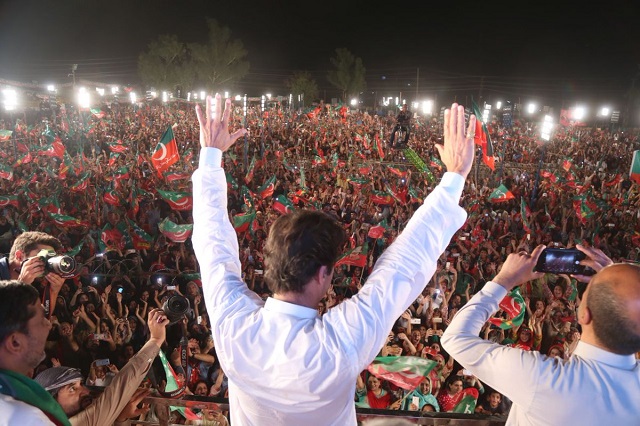
The results of last week’s national and provincial elections in Pakistan came as a surprise to most analysts (including me). And while everyone expected that the Pakistan Muslim League (Nawaz) (PML-N), the incumbent governing party of former prime minister Nawaz Sharif, would take a hit in these polls, few pundits expected the astonishing rout it would suffer across the country.
But more importantly, few observers believed that the Pakistan Movement for Justice (PTI), the party of cricket-hero-turned-politician Imran Khan, would so convincingly beat the two main parties: the PML-N and the Pakistan Peoples Party (PPP), the party of former prime minister Benazir Bhutto now headed by her son, Bilawal Bhutto.
Preliminary results from the Election Commission of Pakistan showed that the PTI had won 115 out of the 272 seats in the National Assembly. In order to form government, the governing party needs 137 seats. That means Khan will need to enter into a coalition with 22 independents and minor-party members. At the last elections in 2013, the PTI came third and could muster only 26 seats. This time around, the PML-N, which secured 148 of the 272 seats in 2013, won only 64. As for the PPP, it came a distant third, with 43 seats. The good news is that terrorist-associated and religious-affiliated parties either were rejected or did poorly.
One can’t sufficiently stress what a political earthquake it has been for Khan’s PTI to so comprehensively defeat the PML-N, including in the province of Punjab, the PML-N’s political heartland. It’s proof of the deep desire for change and of Khan’s widespread popularity, particularly among young voters. Having said that, the PTI electoral tsunami wouldn’t have been possible without the indirect assistance of the military.
While there’s no direct proof of military meddling before the poll, it was an open secret among the intelligentsia and observers of Pakistani politics that the military didn’t want to see the PML-N returned to power. The military apparently played a part in having the supreme court not only expel former prime minister Sharif from power on corruption charges in July 2017, but ban him for life from politics and hand him a 10-year jail sentence. The three-time former prime minister watched the election from his cell.
In addition to the removal of Sharif from the political scene, other behind-the-scenes tactics were used to reduce the PML-N’s political manoeuvrability. These included pressuring newspapers and other media outlets to cover the PML-N in a less sympathetic way, intimidating PML-N lawmakers—including urging them to join PTI—and laying legal charges against a number of senior PML-N officials.
Given the military’s active pursuit of Sharif and his party, it’s little wonder that Khan was considered the military’s man going into the elections. And while there’s no doubt that the PTI benefited greatly from anti-PML-N actions before the poll, the country was absolutely ready for real political change. Corruption in Pakistan had been rife under the PML-N government, as it had been under the previous PPP government. It’s therefore no surprise that Khan’s emphasis on fighting corruption has resonated so deeply with many Pakistanis. Expectations will be high that he delivers on that front early in his administration.
While the PPP, the PML-N and the other parties have declared that the elections were massively rigged and are demanding new polls, it’s unlikely that those accusations will prevent the 65-year-old, Oxford-educated Khan from becoming the next prime minister. EU observers have rejected the rigging charges. In his first speech on the day after the election, Khan promised to provide assistance to the parties to investigate the allegations. Accusing other parties of rigging the elections is almost de rigueur in Pakistan. In 2013, Khan accused Sharif of having stolen the election.
If Khan’s post-election speech is anything to go by, his government will be emphasising domestic issues and implementing the PTI’s election manifesto, which is heavily focused on human development. Fighting corruption, broadening the country’s tax base (only 1% of the population pays income tax), improving governance, and helping farmers will get special attention.
Foreign policy wasn’t an area that Khan talked much about during his election campaign. In his post-election speech, he mentioned his desire to have ‘mutually beneficial’ relations with the US. However, his past anti-American rhetoric is well known. Khan also said he would like to improve relations with India, but stressed that the biggest problem remained Kashmir and human rights violations there. So, we can’t expect much movement on that front too soon. Turning to Afghanistan, and without elaborating, he said he hoped that one day there could be open borders between the two countries. He wants to further strengthen Pakistan’s relations with China.
While the military shouldn’t have any issues with Khan implementing his domestic and foreign policy agendas, one source of friction may be his keenness to follow a dual track—dialogue and military action—with the Pakistani Taliban. Sharif tried to follow that approach and the military quickly put a stop to it, especially after the Peshawar massacre of 132 schoolchildren in December 2014.
Khan will need to tread carefully as he manoeuvres through Pakistan’s treacherous military-dominated political landscape to implement his government’s policy for the ‘New Pakistan’. He will undoubtedly be reminded of Sharif, whose own political career was kickstarted by Gen Zia-ul-Haq in the 1980s, but was later toppled by another general in 1999. He was exiled for almost 10 years, returned to power and is now festering in gaol. In Pakistan, one’s political fortunes can change very quickly indeed.

